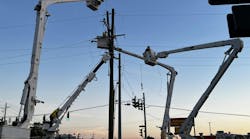James Stanton started in the electric industry more than 30 years ago by a combination of good fortune and friendly connections at the Lower Colorado River Authority’s Fayette Power Project. The project was a 1200-MW power plant east of LaGrange, Texas. At the time, Stanton was proud to say, “I make electricity.”
Stanton’s career from there has been a series of variations on that theme, becoming “I manage electricity” as a system operator to “I buy and sell imaginary electricity” as a power marketer, to the present: “I help people and companies in the electric industry operate more efficiently and reliably.”
Stanton is director of compliance at SOS Intl, which provides training and compliance services to electric utilities. He works in all areas of bulk electric system operation. He has spent the last five years assisting clients in readiness and risk management efforts in compliance through his roles as Principal Advisor at Quanta Technology and Executive Director at SPS Energy. Before that, he served as Director/Project Manager for ICF International providing compliance services.
Stanton and his SOS team focus on reliability in their work in both the Compliance Consulting and Training Consulting areas. Stanton said he sees a consistent concern for and commitment to reliability in every client he has known. “The intricacies of the NERC (North American Electric Reliability Corp.) reliability standards as they apply to different areas of responsibility on the electric systems are a natural consequence of the complexity and operational nuances of the systems themselves,” he said.
Stanton has always been proud to work in the power industry and realizes how crucial its operations are to everyday lives. “The reliability of the interconnected high voltage transmission systems within the three interconnections of North America is perhaps the most vital service we have to sustain our day-to-day lives, our security as a country and the safety of millions of people.”
T&D World visited with Stanton, who was forthcoming about his role at SOS Intl and in the industry:
Q: How does your past experience help you when consulting with clients on their training/compliance programs?
Having broad and diverse history in the industry, including time as a power plant operator, system operator, energy marketer, market design manager and compliance director, also allows me to relate to most anyone in the industry. While I may not always have the answer to a specific equipment or operational issue, I do understand the environment within which the problem exists, and the resources readily at hand here at SOS Intl to help resolve the problem.
Q: Best thing about your job right now?
Working with clients who understand that indispensability I just mentioned, and who are reaching out for help in either understanding their role or enhancing their organizations to maintain and improve reliability. The best part of the job is seeing the smile on their faces at the end of the project when they realize it wasn’t as bad as they feared, and that they have gained an ally going forward.
Q: What consulting projects have you designed/developed in the past, and what’s coming?
I am a firm believer that different organizations will respond to and manage compliance risks in diverse but equally valid ways. I design projects based on the operational and personnel parameters of the specific client. These can run from power plant operator training about reliability standard roles (one of my personal favorites) to designing an Internal Compliance Program for a large utility with perhaps a dozen different divisions and expertise areas that need to function seamlessly and efficiently.
I have had the call from a wind generator who was just informed they needed to register with their Regional Entity within 60 days and who had never heard of an organization called “NERC.” I have been called on to pay a visit to the power plant operations management team who felt reliability standards were a needless government intrusion on their operation and were a waste of time. And there was the great client in California who was able to deregister their generating facility in light of the changes to the definition of the Bulk Electric System, but who wanted to maintain the compliance procedures we had developed together because they were a good idea, regardless of regulatory oversight.
In the near future, we see more emphasis on the Risk-Based approach to monitoring compliance with the reliability standards, and a big push toward defining and implementing internal controls to assure a high level of continuity of compliance. The metaphor occurs to me of the instance when a boy (or perhaps girl) gets their first pocket knife. It’s a very useful thing if you use it correctly, and somewhat painful if you don’t. The Risk Based approach is like that, and we want as many people and companies as possible to have a painless experience with it.
Q: What’s the most important thing you’ve learned in your past experience as a training/compliance consultant that you want to communicate to consultants, trainers, students or participants?
I touched on the concept of different organizations doing things differently. A recognition of that and the subsequent accommodation of those differences into our work is the first lesson I would pass on. There is something to be said for consistency and uniformity across the electric power industry, but as the recent push for risk-based compliance monitoring by NERC demonstrates, one’s risk to the system and the particular impact of a particular entity is anything but uniform and consistent. This commitment to respect a client’s individual operation, experience and expectations is consistent with the old adage of not being able to read a book by its cover. And also, from an advisor perspective, the equally true but not so old advice of “seek first to understand” is especially important.
Q: Why do you think your particular job as training/compliance consultant is important to the utility industry? How does it help SOS’s clients help their system operators?
Any highly skilled and highly specialized job carries with it a commitment to hundreds if not thousands of hours of both structured and empirical training. In his book “Outliers: The Story of Success” Malcom Gladwell asserts that it takes ten thousand hours of practice to be phenomenal at something. While we don’t demand or expect our system operators to be “phenomenal” (though I have met some who are) we do want them to be highly proficient at what they do. And, what they do is manage and maintain the largest machine ever devised by mankind and a machine upon which we depend to a staggering degree for our livelihood, health and safety.
Proper and well-designed training is an absolute must for system operators, and we’re proud of the fact that the vast majority of system operators in the United States have participated in SOS Intl training. As a consumer of electric power, I want the personnel who are managing the generation and delivery system for that power to be competent, prepared and confident in their ability manage the constantly changing Bulk Electric System. We consider ourselves a partner in the achievement of those qualities by our system operators, and a respectful advisor when unforeseen or unique circumstances arise.
Q: What do you like to do in your spare time?
Reading has been a lifelong passion for me, literature and fiction from Dickens, to Poe to Frank Herbert to Thomas Pynchon. Writing has always interested me as well so I continually have some story or another in progress. In some ways it is an escape from my career but in other ways I see parallels in how our electric industry has evolved and a really dramatic story. Nikola Tesla is a favorite historical figure. Crossover issues in some of the Jules Verne stories exist as well, and my power plant and system operations experience will at times elicit a groan when I find a writer who does not know the difference between being shocked and being electrocuted, and who doesn’t understand the second law of thermodynamics.
Q: Anything else you would like to add?
Only that as the electric system continues to evolve in both efficiency and complexity, our training will both accommodate and in some cases, predict emerging challenges for our system operators. The world’s biggest machine gets larger every day, and our dependence on it is ever increasing. We will continue to be the partner in preparation the respectful advisor for both the industry as a whole and for those rare individuals who commit themselves to the system operations desks 24 hours a day, 7 days a week, and without whom we would truly be in the dark.


